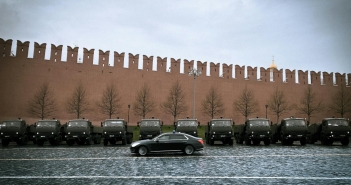The long march of the locked-down migrants[i]
(Aadesh Ravi – composer, lyric writer and singer)
Lyrics
How are the little ones holding up at home?
I wonder how and with what my old mother feeds them?
We toil daily to subsist
Forced to migrate to make ends meet
The nation may be great
But our lives are miserable
This wicked disease struck us
and wrecked our lives
What life is this? What life is this?
a wretched life, a pathetic life
an abject life, a broken life
Is there a disease worse than poverty?
Is there a solace greater than being with one’s family?
Just to be at home in these troubled times would have
been enough
At least we would have survived together, on some gravy
or gruel
The kids flit and hover in my eyes all the time
My wife’s laments chase me ceaselessly
What, what should I do? What am I to do?
What to do? What can I do?
No need of buses or trains, O’ saaru
Just let me go, master! I will walk my way home
No need of buses or trains, O’ saaru
Just let me go, master! I will walk home
How are the little ones holding up at home?
I wonder how and with what my old mother feeds them?
How are the little ones holding up at home?
I wonder how and with what my old mother feeds them?
Let me go, O’saaru! I will walk my way home!
Let me go, master! I will just walk home!
Imagined Communities
Nations, while possessing points of similarity with others, such as a general ‘reverence’ of their external borders, are each a unique and distinct mélange of dominant and disputed histories, cultural groupings, social identities, economic modalities, political structures and legal strictures. Citizens share a set of collective memories and a sense of belongingness with their wider national community – though this can conflict with localised identities particularly in post-colonial states where different ethnic and religious groups were lumped together – despite only ever getting to know a small minority of its members.
These ‘imagined communities’, according to Benedict Anderson, possess a number of characteristics. They imagine themselves as ‘limited’, as each nation sees itself as different from others; ‘sovereign’ as they are free to determine their own destiny; and ‘as a community’ in that no matter how unequal the internal social relations might be, ‘the nation is always conceived as a deep, horizontal comradeship.’[ii]
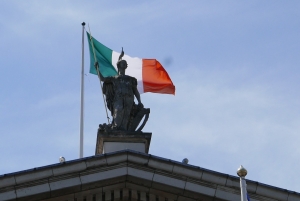
‘Habitus’ and the State
The French sociologist Pierre Bourdieu uses the term ‘habitus’ to describe how individuals are socialised through the ‘historical and cultural production of individual practices – since contexts, laws, rules and ideologies all speak through individuals who are never entirely aware of what is happening.’ Individuals then reproduce these practices, mediated to varying extents by their own self-interest and interpretation.[iii] This individual concept of habitus can be applied at the level of groups, such as a nation. This ‘collective habitus’ refers to its
shared perspective on the world, relatively common sets of values and shared dispositions to believe and behave in particular ways. The state partially orchestrates this collective habitus by creating the conditions under which certain things come to be viewed as natural and inevitable… and others unthinkable… But perhaps the most effective way that the state creates an orchestrates this collective habitus is by ensuring that is seen by the people it governs as being ‘the voice of the people’, which gives it legitimate authority to rule us, and even to exercise violence against us.[iv]
As individual nations have their own distinctive ‘collective habitus’, the political and social contexts within which governments operate will vary. This will impact upon the respective levels of freedom they have to resort to force or repressive measures in advancing specific policies. What is deemed acceptable by the citizens of different polities will largely depend on the history of repression in their states, the restrictions accepted in the past, the tradition of resistance, public confidence in the authorities, the current levels of political freedom and whether the state and its citizens are faced by some form of existential threat.
An interesting illustration of how the historical experiences and collective habitus of a nation can impact upon how repressive measures are accepted and rejected, can be seen in the reaction of some segments of society and even the political leadership in the U.S. to the lockdown. In several cities, large gatherings of citizens were able to successfully assemble in public to protest lockdowns in defiance of restriction on movement ordinances.
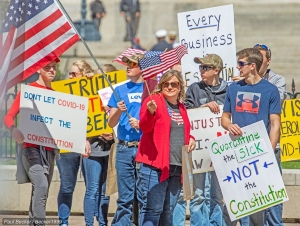
Paul Becker/wikicommons
Moreover, not only did the U.S. President Donald Trump state his support for their actions but he even went so far as to encourage them to ‘liberate Minnesota, Michigan and Virginia’, states which are, not surprisingly, ‘election swing states with Democratic governors.‘[v] In many other nations, such acts of civil disobedience, in contradiction of state ordinances enacted to protect citizens from an infectious disease, would have been heavily clamped down upon by the authorities.
Power, Control and the Use of Force
In his book on Power, John Scott expounds on modern governmental management of a territory and the political management of nations and their citizens.
Modern rulers… see their task as one of government in… shaping, guiding, and directing of the conduct of others by using persuasive processes of signification and legitimation to work through their desires, aspirations, interests, and beliefs… Sovereignty over territory also involves the management of the population to regulating the life processes through which they live, work, and relate to each other. This is what Foucault termed ‘bio-politics’… discipline is a control that is exercised over people through systems of rules that are not simply imposed on them but are instilled in them.”[vi]
Governments can increase their power and control either by direct imposition of repressive measures or through the prohibition of alternative voices and movements, which they wish to suppress. In most instances, a judicious melding of both methods will be applied. The precise mix will depend on the political and social environment together with the historical experiences of the state in question.
However, it is important to remember, as Max Weber emphasises, that while:
Force is certainly not the normal or only means of the state… but force is a means specific to the state… the state is a relation of men dominating men [and generally – one should add – of men dominating women], a relationship supported by means of legitimate (i.e. considered to be legitimate) violence…[vii]
As David Held writes ‘the web of agencies and institutions’ of a state find their ultimate sanction in the claim to the monopoly of coercion, and a political order, is only, in the last instance, vulnerable to crises when this monopoly erodes.[viii]
Covid-19 – Gateway to Repression?
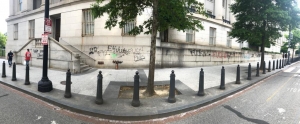
Confronted by an unprecedented and menacing threat, it is normal for people to feel disorientated and even experience levels of panic disproportionate to the threat itself. It is not surprising therefore that the past few months have seen the imposition of unprecedented restrictions in response to Covid-19 by governments around the world. Emergency powers have been used to shut down large sectors of the economy, enforce movement restrictions, screen and isolate potential carriers, and enforce quarantining.
Covid-19’s rapid spread around the world has impacted upon people living in a wide variety of political, economic, social and cultural contexts. These diverse contexts have mediated the repressive policies available to governments – facilitating, refracting or impeding the measures they have attempted to impose – the insecurity and fear caused by the pandemic have undoubtedly facilitated the imposition of repressive measures.
While these measures have generally been implemented in response to scientific guidelines on how to tackle Covid-19, they should be limited to what is required and not used as a means to surreptitiously increase governmental power. Furthermore, as Amnesty International researcher Massimo Moratti warns, while states of emergency are permitted under international human rights law, such restrictive measures should not become a “new normal” and should last no longer than the danger that has necessitated their implementation.[ix]
‘Shock Doctrine’
In her book The Shock Doctrine, Naomi Klein describes how this process mimics the CIA method of ‘coercive interrogation’ which aims at breaking ‘resistant sources’ by creating violent ruptures between prisoners and their ability to make sense of the world around them. Klein argues that this is how shock doctrine works: ‘the original disaster, the coup, the terrorist attack, the market meltdown, the war, the tsunami, the hurricane – puts the entire population into a state of collective shock. Like the terrorised prisoner who gives us the names of comrades and renounces his faith, shocked societies often give up things they would otherwise fiercely protect.’[x]
The advent of Covid-19 has led to a situation where people are confronted by an infectious disease, for which there is no vaccine, and global lockdowns resulting in deep and widespread social and economic disruption. This has provided an opportune environment for governments to increase their power and control as well as advancing interests of their more powerful supporters. Repressive policies and measures can be introduced, as the ‘shock’ caused by the Covid-19 pandemic leaves the public less able to resist. In a world where lockdowns, isolation and quarantining have become the new accepted norm, coordinated, active resistance to repressive and inhibiting policies has become more complicated. As Patrick Cockburn points out:
Autocratic governments everywhere are becoming more autocratic and repressive regimes more repressive. They believe that they can get away with it: frightened peoples are looking to their governments to save them in this time of peril, and do not want to discover that they are ruled by incompetent people determined to serve their own interests and stay in power.
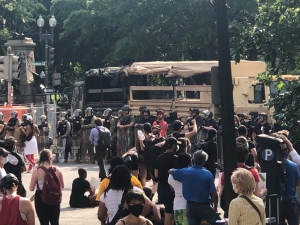
State Repression
While most of the measures imposed to fight Covid-19 have some level of scientific justification, emergency and repressive powers entail an inherent risk of abuse. Moreover, it is clear many governments have used the COVID-19 pandemic to push through laws and other measures that impose disproportionate restrictions on public freedom and civic rights.
Significant international controversy arose with the granting of wide ranging powers to Viktor Orban, the Hungarian PM, and his Fidesz party, which decreed jail terms of up to five years for the intentional dissemination of misinformation that might impede the government’s tackling of Covid-19. While the chilling effect of this legislation was widely criticised, it was the refusal to place any time limits on the powers being abrogated by Orban and his regime that led to the most concern.[xi]

Viktor Orban
Writing in late March, Osama Tanous describes how Covid-19 has been used as an excuse by Israel to further repress Palestinians:
Repression has continued, with the Israeli occupation forces using the excuse of increased police presence to continue raids on some communities, such as the Issawiya neighborhood in East Jerusalem, home demolitions in places like Kafr Qasim village and the destructi‘’on of crops in Bedouin communities in the Naqab desert.[xii]
Despite initially downplaying the threat posed by Covid-19 and the publics’ ‘hysterical’ response to it, the Philippines President Duterte has subsequently implemented an ‘extreme, militarized approach.’ By early April, the Duterte regime had arrested almost as many people for alleged violations of the Covid-19 lockdown and curfews as had been tested for the virus.[xiii]
In Colombia, already heavily besieged rural and indigenous communities have come under even greater threat as a result of the Covid-19 measures enacted to prevent transmission. In the week following imposition of quarantine measures in cities across Colombia in mid-March, three social leaders were murdered. Already one of the most dangerous countries in the world for social activists and community leaders, with 271 activists killed since the conclusion of the early 2017 peace deal between the government and the Revolutionary Armed Forces of Colombia (Farc), the government’s focus on the pandemic has led to activists saying they are now at even greater risk.[xiv]
On March 16, a group of United Nations human rights experts warned that,
emergency declarations based on the COVID-19 outbreak should not be used as a basis to target particular groups, minorities, or individuals. It should not function as a cover for repressive action under the guise of protecting health … and should not be used simply to quash dissent.[xv]
Furthermore, as the OSCE Right’s Chief, Ingibjörg Sólrún Gísladóttir emphasised, a state of emergency must be proportionate to its aim, and only remain in place for as long as absolutely necessary.[xvi]
Cloaking Repression
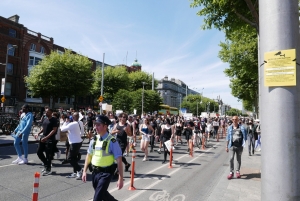
Repression is not just a matter of custodial torture and extra-judicial murder. Mis-governance or mal-governance is repression too.[xvii] Joel Simon, writes about a new face of repression he terms ‘Repression 2.0.‘ This form of repression continues to incorporate imprisonment and state censorship but it also, at the same time, applies new information technologies such as smartphones and social media to give it a softer edge, masking the harsher aspects. According to Simon:
Masked political control means a systematic effort to hide repressive actions by dressing them in the cloak of democratic norms. Governments might justify an internet crackdown by saying it is necessary to suppress hate speech and incitement to violence. They might cast the jailing of dozens of critical journalists as an essential element in the global fight against terror.[xviii]
As Patrick Cockburn explains:
Governments worldwide claim that journalists are impeding their heroic struggle against coronavirus, but their real motive is more often to conceal the inadequacy of those efforts. Political elites everywhere fear that the pandemic will expose their incompetence and corruption, weakening their grip on political power and economic resources.[xix]
Writing in pre-Covid-19 times, Simon used the ‘fear of terrorism’ as an example how a government might justify repressive actions. Today, similar arguments are being used to validate punitive measures to fight the current pandemic and prevent the dissemination of disinformation. In the digital age, people can access and disseminate information more freely and in real time. However, the technology that enables this unprecedented intensity and extensity of communication has allowed states to devise and develop measures to corrupt information flows by manipulating and influencing the content that reaches people, thus facilitating a new form of censorship. While [This] tactic is commonly used in countries rated as having closed or repressed civic space… [it]has also been seen in all corners of the globe as a subtle tool to silence critics.[xx]
The aim here is to control the narrative and if this proves impossible to at least prevent a coherent oppositional one. As White House Chief Strategist, Steve Bannon once said, the story is more important than reality.[xxi] Today, many governments are applying this dictum to their communications on Covid-19.
Twitter-Gate
The circulation of conspiracy theories can also be co-opted by governments as a valid rationale for the curbing of the free flow of information, on the grounds they are misleading and may be used, as in their usage by extreme groups, to stir up animosity and violence against targeted groups. However, once these repressive measures they can be used to increase government control over the general flow of information, thus having a chilling effect on communications and alternative narratives, as well as potentially preventing the development and implementation of genuine civil society initiatives.
An interesting outcome of the struggle to control the flow of information has been that in the U.S., where social media platforms have been caught in the crosshairs of Trump and his administration. Well in advance of Covid-19, governments around the world had been criticising the dissemination of ‘fake news’ and misleading stories being posted and circulated via social media. Incidents such as the burning of phone masts due to false rumours that they were helping to spread Covid-19 and the dissemination of dangerous remedies to fight the virus, the call for social media platforms to monitor content posted has only increased.
In response, social media companies have started to police posts to a greater extent, purportedly to prevent injurious or false content being uploaded. This increased monitoring of posts led Twitter to fact check a post by Trump over a ‘false assertion that mail-in voting leads to widespread voter fraud.’ In a fit of presidential pique, Trump retaliated by signing an executive order on May 28 that would decrease the protection of social media companies from being sued for content posted on their services.[xxii]
Failing the Vulnerable
The development and implementation of measures to reduce the spread of Covid-19 need to take into account the particular needs of the most vulnerable. Unfortunately, as the UN Special Rapporteur on extreme poverty and human rights, Philip Alston writes, this has not been the case as many countries have blithely ignored the needs of the most vulnerable communities,
The policies of many States reflect a social Darwinism philosophy that prioritises the economic interests of the wealthiest, while doing little for those who are hard at work providing essential services or unable to support themselves… Governments have shut down entire countries without making even minimal efforts to ensure people can get by. Many in poverty live day to day, with no savings or surplus food. And of course, homeless people cannot simply stay home.[xxiii]
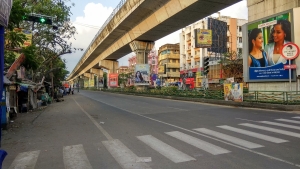
Tanay barisha (wikimedia)
During an address to the nation at 8pm on March 24, the Indian Prime Minister Narendra Modi announced that a strict lockdown of 21 days duration would come into force throughout the whole of India at midnight. Every state, district and village were subject to this lockdown.[xxiv] The initial lockdown was to be for three weeks, though it has been extended since, and the people of India were informed they would have to get used to staying at home. Modi warned:
Do not step outside your house. For 21 days, forget what is stepping outside. There is a Lakshman Rekha[xxv] on your doorstep. Even one step outside your house will bring the coronavirus inside your house.[xxvi]
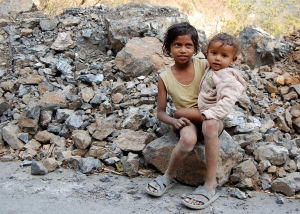
Paulrudd (wikimedia)
Acknowledging that these measures could provoke ‘hard times’ for the poor in India, Modi insisted that draconian lockdown measures were required to prevent the untrammelled diffusion of Covid-19, which ‘spreads like wildfire.’[xxvii] While Modi and the Indian government might argue they had ‘reasonable justification’ for ordering such a harsh lockdown, they could surely have implemented it in a manner which would have relieved the severity of its impact on migrant workers and the impoverished. As Professor of Gender and Development Nitya Rao outlines:
Half of India’s 1.3 billion people are food insecure which means they lack access to sufficient safe and nutritious food. Around 60% of the poorest people from India’s scheduled tribes and scheduled castes, are also anaemic. This means that a total lockdown, while it may help stop the spread of coronavirus, is likely to have a significant impact on food and nutrition. Deprived of the ability to work, threatened by arrest if they ventured forth to secure their rations, the poor of India risked starvation.[xxviii]
The Indian ‘Trail of Tears’
As the lockdown came into force, a serious humanitarian crisis erupted with in excess of an estimated hundred million migrant workers stranded in cities and other locations around India with no work or ability to pay for accommodation.[xxix] Many of these migrants were forced to part with their meagre savings so they and their families could gain places in overcrowded trucks to try and get home. Many more were unable to afford the luxury of transport were forced to make their way home by foot. The traumatic scenes of hordes of migrants of all ages, from babies carried by fatigued parents and siblings to old men and women, struggling along the roads of India in a desperate attempt to return home became a common sight.[xxx]
One of the many heart-breaking stories that have emerged from this modern ‘Trail of Tears’ is that of Jamlo Madkam, a 12-year-old girl. Her parents, Andoram (32) and Sukamati Madkam (30) had eight children. As Jamlo’s mother Skamati recounts, ‘I gave birth to eight children, and of them four died at the age of crawling. And now Jamlo is dead too.’ Jamlo left her home in mid-February for the first time to work at a chilli farm in Telegana with relatives and friends. When the lockdown was instituted, she was left with no choice but to try and make her way home. Tragically, Jamlo passed away on April 18 from exhaustion and lack of food and water. She was only 11 kms from her home in Aded in Bijapur district of Chhattisgarh, having walked more than 100 kms over three days.[xxxi]
Bringing the virus home
Follow-up on the condition and living circumstances of labourers who managed to return to their villages is, at best, minimal. Professor Nitya Rao reports how a local project coordinator witnessed truckloads of migrant families returning from Andhra Pradesh, Chhattisgarh, Karnataka and Kerala to their homes in Koraput district in the week leading up to March 26th. The economic situation of these returnees was extremely precarious as many had not received their payments and had little prospect of any income in the coming months. In addition, they might have brought Covid-19 with them back to their families and communities, with whom they live in cramped quarters.[xxxii]
As Arundhati Roy writes:
The lockdown to enforce physical distancing had resulted in the opposite — physical compression on an unthinkable scale. This is true even within India’s towns and cities. The main roads might be empty, but the poor are sealed into cramped quarters in slums and shanties.[xxxiii]
The lack of consideration of the impact of these Covid-19 measures on the more vulnerable members of society is not just on the part of governments. Humra Quraishi writes of the ‘wretched mode of thinking’ on the part of ‘upper-middle class people’ who report that the lockdown is causing them no problems as they can access all they need, blithely ignorant to the suffering of the poor as they themselves ‘have never been exposed to hunger.’[xxxiv]
Of course, India is not the only country that has seen the more vulnerable members of society suffering disproportionately due to repressive measure that that fails to consider or take account of their needs. In Colombia, while the more affluent have isolated themselves in relative comfort during the lockdown, the more vulnerable have experienced severe economic hardship and increased food insecurity. The urban informal sector of small-scale and street vendors comprising the greater part of the Colombian economic system, deprived of adequate support to help them through this period, now face having to choose between letting themselves and their families die of hunger or of Covid-19.[xxxv]
Repression Post Covid-19?
The struggle against the Covid-19 pandemic has provided scientific justification for the imposition of repressive methods including quarantining, isolation and lockdowns. Although their design and implementation have been disputed, there was general agreement that action was required to avoid overwhelming the public health services, often already stretched to their limits due to chronic under-funding. However, there is widespread concern governments might keep repressive and increased surveillance measures in place post Covid-19.
According to the Israeli historian Yuval Noah Harari:
My home country of Israel, for example, declared a state of emergency during its 1948 War of Independence, which justified a range of temporary measures from press censorship and land confiscation to special regulations for making pudding (I kid you not). The War of Independence has long been won, but Israel never declared the emergency over, and has failed to abolish many of the “temporary” measures of 1948 (the emergency pudding decree was mercifully abolished in 2011).”[xxxvi]
Hariri goes on to warn that ‘data-hungry governments’ might try to keep biometric surveillance measures in place on the grounds there might be a second wave of Covid-19. Yuval fears that this could help overcome the resistance of those campaigning for the right to privacy as many might accept this argument given the understandable concern of people in general to place health concerns above those of privacy.[xxxvii]

Google HQ, Dublin.
Since May 5th, the U.K. government has been running a trial of a contact tracing app which has been made available on the Isle of Wight for its residents. The NSHX app chosen by the government however presents a number of ‘practical, legal and ethical questions and concerns that need to be answered.’ Primary amongst the concerns raised is the fact that the NSHX app, uses a centralized model. This means that the data collected by this app will not just be retained on your phone but will also be collected centrally on government servers. This is in contrast to the privacy-protective models chosen by most other European countries, including Germany, Italy and Ireland.[xxxviii] Although, it should be noted that the Irish app is also facing issues with respect to privacy issues in addition to technical concerns.[xxxix]
Far-Right
Jumping on the Covid-19 fear bandwagon has become a central plank in the platform of the far-right as it capitalises on the elevated levels of social disorientation due to the pandemic. As Barbara Perry director of the Centre of Hate, Bias and Extremism at the University of Ontario Institute of Technology highlights, ‘[T]here’s nothing the far right likes more … than a crisis.’ Increased online right wing activity during Covid-19 comes under three main rubrics: ‘conspiracy theories, anti-immigrant and xenophobic attitudes and accelerationist rhetoric, which is concerned with trying to hasten the collapse of society and a race war that would lead to a “white ethno-state.‘[xl]
A report produced by the London-based Institute of Strategic Dialogue documents how ‘far-right communities have started talking about COVID-19 as an accelerant for a second civil war, also known as boogaloo… From Feb. 1 to March 28, more than 200,000 posts on social media contained the word “boogaloo.” The most popular hashtag within those posts was “#coronachan.’[xli]
Worryingly, Perry warns these narratives are not restricted to the far right anymore, if that was ever truly the case. She notes that ‘[T]here’s a bigger audience for folks for the far right now. So many of us are online… So we’re so vulnerable, I think, to this sort of messaging.‘ [xlii]
In a recent article, Thomas Klikauer and Nadine Campbell outlined how the Nazi leader Hermann Goering once observed that ‘the people can always be brought to the bidding of the leaders. That is easy. All you have to do is tell them they are being attacked and denounce the pacifists for lack of patriotism and exposing the country to danger. It works the same way in any country.‘ Klikauer and Campbell then go on to highlight how Neo-Nazis in Germany have adopted a similar approach to that advocated by Goering, by weaving ‘their ideology into the fear of the coronavirus.‘[xliii]

President Donald Trump talks to senior staff Steve Bannon during a swearing in ceremony for senior staff at the White House in Washington, DC January 22, 2017. REUTERS/Carlos Barria
Staying Vigilant
There is a need for the public to rest vigilant to the introduction of repressive and enhanced surveillance methods in this time of Covid-19, both to ensure theses measures are appropriate and fit for purpose, and are rescinded with the passing of the pandemic.
We also need to pay attention to the impacts that repressive measures can have on the most vulnerable in our midst including, inter alia, people on low income with few resources, the homeless, asylum seekers forced to live in direct provision and women at home with abusing partners, and hold our governments to account in this respect. In Australia, experts centrally involved in Australia’s Covid-19 response and the Australasian Society for Infectious Diseases have advocated on behalf of immigration detainees and recommended the relocation of those considered no major security or health risk, to safe accommodation in the community.[xliv]
As the Australian Human Rights Commissioner, Edward Santow, asserts:
We must… speak up for those whose voices are hardest to hear… If combating Covid-19 is a war, we can be proud of why we got into the fight: to preserve life, especially for vulnerable people. Those are the best of our values. We must now ensure those same values guide how we fight.[xlv]
[i] These are the lyrics from a song written by Aadesh Ravi, a Hyderabad composer, about the suffering caused by the lockdown migrations across India. You can see the story behind this song and also listen to it at the following link – Aadesh Ravi, The long march of the locked-down migrants, Rural India online, 16 May 2020, https://ruralindiaonline.org/articles/the-long-march-of-the-locked-down-migrants/
[ii] Benedict Anderson, Imagined Communities, Verso (new edition): London/NY, 2006, pages 6-7
[iii] Jen Webb, Tony Schirato and Geoff Danaher, Understanding Bourdieu, Sage: London/Thousand Oaks/New Delhi, 2002, p. 15
[iv] Jen Webb, Tony Schirato and Geoff Danaher, Understanding Bourdieu, Sage: London/Thousand Oaks/New Delhi, 2002, p. 93
[v] Sanjana Karanth, Trump Defends Right-Wing Protesters Fighting Coronavirus Restrictions: ‘These Are Great People’ Huff Post, 19 April 2020, https://www.huffpost.com/entry/trump-defends-right-wing-protesters-fighting-coronavirus-restrictions-great-people_n_5e9d0ceec5b635d25d6efeb2
[vi] John Scott, Power, Polity: Cambridge, 2001, page 10
[vii] David Held, Introduction States and Societies, 1983, The Open University, Oxford, page 35
[viii] Ibid, page 36
[ix] CBC News, Hungary’s Orban, Serbia’s Vucic seize greater authority amid coronavirus lockdowns, Canada Broadcasting Corporation, 31 March 2020, https://www.cbc.ca/news/world/hungary-serbia-coronavirus-authority-1.5515846
[x] Naomi Klein, The Shock Doctrine, Penguin: London, 2008, pages 15-16
[xi][xi]Shaun Walker and Jennifer Rankin, Hungary passes law that will let Orbán rule by decree, The Guardian, 30 March 2020, https://www.theguardian.com/world/2020/mar/30/hungary-jail-for-coronavirus-misinformation-viktor-orban)
[xii] Osama Tanous, Coronavirus outbreak in the time of apartheid, Aljazeera, 24 March 2020, https://www.aljazeera.com/indepth/opinion/coronavirus-outbreak-time-apartheid-200324151937879.html
[xiii] William D. Hartung, Duterte uses Covid-19 response to broaden reign of fear and repression, CNN, 20 April 2020, https://edition.cnn.com/2020/04/20/opinions/duterte-covid-19-philippines-repression-hartung/index.html
[xiv] Joe Parkins Daniels, Colombian death squads exploiting coronavirus lockdown to kill activists, Guardian, 23 March 2020, https://www.theguardian.com/world/2020/mar/23/colombian-groups-exploiting-coronavirus-lockdown-to-kill-activists
[xv] Human Rights Watch (HRW), Thailand: COVID-19 Clampdown on Free Speech, HRW, 25 March 2020, https://www.hrw.org/news/2020/03/25/thailand-covid-19-clampdown-free-speech
[xvi] OSCE Press Release, Newly declared states of emergency must include a time limit and parliamentary oversight, OSCE human rights head says, OSCE, 30 March 2020, https://www.osce.org/odihr/449311
[xvii] Ashok Agrwaal, State Repression: Behind the Mask of Democracy, Combat Law, 2002, page 4, https://www.academia.edu/26287742/STATE_REPRESSION_Behind_the_Mask_of_Democracy
[xviii] Joel Simon, Introduction: The New Face of Censorship, Committee to Protect Journalists, 25 April 2017, https://cpj.org/2017/04/introduction-the-new-face-of-censorship.php
[xix] Patrick Cockburn, ibid
[xx] CIVICUS Monitor, People Power Under Attack 2019, December 2019, CIVICUS, Page 8, https://civicus.contentfiles.net/media/assets/file/GlobalReport2019.pdf
[xxi] Thomas Klikauer – Nadine Campbell, Conspiracies and the Coronavirus in the USA and Germany, Counterpunch, 20 May 2020, https://www.counterpunch.org/2020/05/20/conspiracies-and-the-coronavirus-in-the-usa-and-germany/
[xxii] David Ingram and Dylan Byers, Trump set the stage for tech’s free speech title fight. Zuckerberg and Dorsey are the main event., NBC, https://www.nbcnews.com/tech/social-media/trump-set-stage-tech-s-free-speech-title-fight-zuckerberg-n1217666
[xxiii] OHCHR News, Responses to COVID-19 are failing people in poverty worldwide” – UN human rights expert, UN Office of the High Commissioner for Human Rights News, 22 April 2020, https://www.ohchr.org/EN/NewsEvents/Pages/DisplayNews.aspx?NewsID=25815
[xxiv] India Today Web Desk, Coronavirus in India: PM Modi announces 21-day national lockdown, India Today, 24 March 2020, https://www.indiatoday.in/india/story/coronavirus-india-pm-narendra-modi-national-lockdown-21-days-announcement-five-points-1659282-2020-03-24
[xxv] Originally a line drawn by Lakshmana around the residence he shares with his brother Rama and sister-in-law Sita to protect Sita, as recounted in the Ramayana. In modern India, ‘Lakshmana Rekha’ refers to a strict convention or regulation which must be followed.
[xxvi] The Economic Times (India), India will be under complete lockdown for 21 days: Narendra Modi, Economic Times-India Times, 25 March 2020, https://economictimes.indiatimes.com/news/politics-and-nation/india-will-be-under-complete-lockdown-starting-midnight-narendra-modi/articleshow/74796908.cms
[xxvii] Ibid
[xxviii] Nitya Rao, India’s coronavirus lockdown will hit women and migrant workers hardest, The Conversation, 26 March 2020, https://theconversation.com/indias-coronavirus-lockdown-will-hit-women-and-migrant-workers-hardest-134689
[xxix] Chinmay Tumbe, In times of a lockdown, support migrant workers, Hindustan Times, 26 May 2020 (updated), https://www.hindustantimes.com/analysis/in-times-of-a-lockdown-support-migrant-workers/story-A3EglS9L3AHRCCuDA0z4TP.html
[xxx] Newsclick Report, Why Home Ministry’s Travel Plan for Migrant Workers Will Create More Chaos, Newsclick, 12 May 2020, https://www.newsclick.in/Home-Ministry-Travel-Plan-Migrant-Workers-Cause-Chaos
[xxxi] Purusottam Thakur and Kamlesh Painkra, Jamlo’s last journey along a locked-down road, Rural India Online, 14 May 2020, https://ruralindiaonline.org/articles/jamlos-last-journey-along-a-locked-down-road/
[xxxii] Nitya Rao, ibid, https://theconversation.com/indias-coronavirus-lockdown-will-hit-women-and-migrant-workers-hardest-134689
[xxxiii] Arundhati Roy, ‘The pandemic is a portal’, Financial Times, 3 April 2020, https://www.ft.com/content/10d8f5e8-74eb-11ea-95fe-fcd274e920ca
[xxxiv] Humra Quraishi, Covid-19: ‘All is Well’ Narrative Slips and Falls, Newsclick, 12 May 2020, https://www.newsclick.in/COVID-19-Pandemic-India-Workers-Farmers-Suffer-Middle-Class-Apathetic
[xxxv] Colombia Solidarity Campaign, Colombia – Covid 19 Pandemic, Colombia Solidarity Campaign (UK), 13 April 2020, https://www.colombiasolidarity.org.uk/campaign-media/25-news/657-colombia-covid-19-pandemic
[xxxvi] Yuval Noah Harari, the world after coronavirus, Financial Times, 20 March 2020, https://www.ft.com/content/19d90308-6858-11ea-a3c9-1fe6fedcca75
[xxxvii] Ibid
[xxxviii] Amnesty International UK, 7 principles that should be guiding roll-out of any COVID-19 contacting-tracing app, Amnesty, 19 May 2020, https://www.amnesty.org.uk/coronavirus/7-principles-contact-tracing-app-rollout?utm_campaign=MEMA2523_UPT_HRUK_COVID19_tracingapp&utm_content=12714&utm_source=amnestyuk&utm_medium=email
[xxxix] Adam Maguire, Privacy concerns and technical doubts dull hopes of HSE Covid-19 app’s value, RTE, 01 June 2020, https://www.rte.ie/news/coronavirus/2020/0530/1143516-covid-app-hse/
[xl] Andrea Bellamare, Far-right groups may try to take advantage of pandemic, watchdogs warn, Canadian Broadcasting Corporation, 9 April 2020, https://www.cbc.ca/news/technology/far-right-opportunistic-covid-pandemic-1.5526423
[xli] John P. Mello Jr., Far-Right Spreads COVID-19 Disinformation Epidemic Online, Technews World, 5 May 2020, https://www.technewsworld.com/story/86648.html
[xlii] Ibid
[xliii] Thomas Klikauer – Nadine Campbell, The Covid-19 Conspiracies of German Neo-Nazis, Counterpunch, 26 May 2020, https://www.counterpunch.org/2020/05/26/the-covid-19-conspiracies-of-german-neo-nazis/
[xliv] Edward Santow-Australia’s human rights commissioner, We must combat Covid-19 but creeping authoritarianism could do more harm than good, The Guardian, 7 April 2020,
[xlv] Ibid




